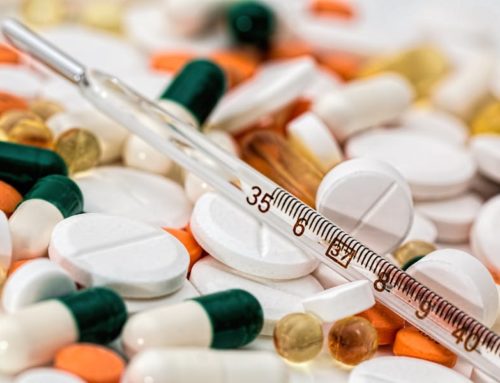Increased intestinal permeability, commonly called leaky gut, is a red flag that toxins may be overburdening a patient’s or client’s system. Also, parasites or other microbes could be eroding their health.
Several lifestyle factors, such as chronic stress and poor dietary choices, may also contribute to leaky gut. Certain medications can play a role, too.
When you identify and address the underlying causes of leaky gut, you can help your patients/clients take the right steps to fix the problem and potentially prevent other health issues that could crop up in the future.
Concerns with Leaky Gut
The interior lining of the gut is semipermeable to let certain particles through — like nutrients — but prevent others from being absorbed from the digestive tract.
Still, sometimes unwanted substances sneak across the gut wall. Scientists call this “increased intestinal permeability” or “intestinal hyperpermeability.” But in layman’s terms, this is what is referred to as a “leaky gut.”
Keep in mind, a little leakiness is normal. Minor leaks help train the immune system not to overreact to foods and normal gut bacteria. But when there’s an uptick in leakiness, it could be harmful. (1)
When people talk about leaky gut, they are often referring to increased permeability of the small intestine. When the wall of the small intestine is compromised, it may absorb incompletely digested food, toxins, and bacteria. (2)
Still, in some conditions — such as liver disease and Crohn’s disease — the wall of the large intestine may be hyperpermeable and can damage the large intestine. This may also allow toxins and microbes to seep through. (3, 4, 5, 6)
Due to its link with major diseases, leakiness of the large intestine may be more obvious. Increased permeability of the small intestine may be a little harder to identify. (7)
How the Gut Wall Works
Even though a crucial role of the small intestine is to absorb nutrients, it simultaneously must keep out pathogens and toxins. Despite this important job, only a single layer of epithelial cells line the inside of the gut.
Given that the lining of the small intestine is only one-cell thick, it’s easy to see how vulnerable it could be for damage and dysfunction. (1, 8, 9)
A key part of the gut lining that can malfunction is the tight junctions, the complex proteins found between the epithelial cells. Tight junctions connect epithelial cells and regulate what can pass between them. They are designed only to let beneficial nutrients cross over from the gut into the underlying tissue. From there, they can be absorbed into the blood or lymph. (10, 11, 12)
At the same time, the tight junctions aim to keep out harmful elements, including allergens, pathogens, and toxins.
Still, this system isn’t always reliable. Sometimes unwanted items like bacteria and incompletely digested food squeeze through the gaps between the gut’s epithelial cells. (13)
How Leaky Gut Happens
The control of the gut’s tight junctions is complex. Several factors may disrupt them, including infections, inflammation, and specific dietary components.
Breaching tight junctions
Harmful microbes and parasites can alter the tight junctions in the gut wall, which results in a bigger gap between the gut’s epithelial cells to lead to leaky gut. (14, 15)
As for dietary factors, gluten is the best-known trigger of leaky gut. It’s particularly problematic if your patient/client has celiac disease, but it may trigger leaky gut to a lesser extent in other people as well. (10)
Gluten breaches the gut by increasing the body’s release of zonulin, a protein involved in controlling the tight junctions. It’s believed that an increase in zonulin, or similar proteins, opens up the spaces between the cells of the gut wall, resulting in leakiness. (16)
Besides gluten, other incompletely digested food components and toxins may also leak through the gut wall. Exactly how this happens isn’t clear, and many questions remain about exactly how the tight junctions are controlled. (1)
Addressing the breach
Immune system cells underneath the gut lining are activated when unwanted molecules, including incompletely digested food, pass through. However, this immune system response can generate a lot of inflammatory molecules, which can cause people to experience unpleasant symptoms and could worsen leaky gut. (6, 17)
Because leaked food components are microscopic, they don’t have free reign to travel throughout the body. Rather, everything absorbed from the gut into the bloodstream travels first to the liver, acting as a filtration system to help remove digestive debris. (13)
However, this takes away from the liver’s ability to get rid of toxins from other sources. So, toxins may build up, which can damage the liver and worsen leaky gut. (18, 19)
Leaky Gut Symptoms
The symptoms of leaky gut vary from person to person and might be vague or difficult to pin to a specific cause. Probably the best-known symptoms are gut-related, such as abdominal cramping, bloating, chronic constipation or diarrhea, and gas. (2, 10, 20)
Hand-in-hand with these gut symptoms are food sensitivities. New research confirms that increased intestinal permeability may play a role in food sensitivities and the resulting digestive symptoms. (21, 22)
Some of this research uses live microscopic evaluation of the gut lining. This enables scientists to see changes in the intestinal tissues and cells right when they’re happening. This type of live microscopic exam, called Confocal laser endomicroscopy (CLE), was used in a study of people with irritable bowel syndrome (IBS). They were given a series of four different food components — from milk, soy, wheat, or yeast — directly into their gut. (22, 23)
The scientists found that 50% of the people had immediate disruption of their gut barrier when exposed to these foods. The researchers could see the gut becoming leaky within minutes of injecting the foods into the small intestine. The people also developed gut symptoms, but these didn’t happen right away. (22)
That study only looked at the digestive tract effects of food sensitivities and leaky gut. But your patients/clients may also experience non-digestive symptoms, including excessive fatigue, migraine headaches, and skin issues like eczema. (2, 24, 25, 26)
Conditions Linked with Leaky Gut
The state of having a leaky gut isn’t a disease per se, despite the frequent use of the phrase “leaky gut syndrome.” Rather, increased intestinal permeability is a sign of dysfunction in the gut. This faulty activity may contribute to disease.
Digestive conditions like celiac disease, Crohn’s disease, IBS, and ulcerative colitis are commonly linked to leaky gut. That’s not particularly surprising. But studies are also linking leaky gut with a variety of non-digestive disorders and diseases. (9, 27)
Some other health conditions associated with leaky gut include:
- Alzheimer’s disease (28)
- Asthma (29, 30)
- Autism (31)
- Depression (32)
- Diabetes (33)
- Liver disease (34)
- Multiple sclerosis (35)
- Obesity (36)
- Parkinson’s disease (37)
- Rheumatoid arthritis (38)
In most of these health conditions, it’s unclear exactly how leaky gut might play a role. Immune system reactions and inflammation may be involved. These may both promote leaky gut and result from leaky gut. Further research is ongoing. (33, 39)
5 Leaky Gut Triggers
Several lifestyle factors can increase the risk of a leaky gut. Certain infections and toxins can also be a factor.
Here are five major factors that influence the development of leaky gut.
1. Infections
A variety of infections may increase intestinal permeability as many of these interfere with the tight junctions that guard the intestinal border. (15)
Here are some examples of specific microbes and other critters that may promote leaky gut:
- Bacteria — Helicobacter pylori, a bacteria that causes ulcers, can interfere with the tight junctions in the gut. Several bacteria that cause food poisoning — including Clostridium, Salmonella, and Shigella — can also disrupt intestinal tight junctions. (15)
- Fungi — While Candida albicans is a fungus and normal part of the microbiome, serious issues can result from the overgrowth of this yeast. Lab studies reveal that Candida can increase gut inflammation and intestinal permeability. (40, 41)
- Parasites — The microscopic parasite Giardia can disrupt tight junctions and the parasitic roundworm Ascaris can cause intestinal discomfort and increase gut permeability. Other parasites can harm intestinal health as well. (15, 42, 43)
- Viruses — Rotavirus, which causes stomach upset and diarrhea, can interfere with intestinal tight junctions. It disrupts the integrity of the gut barrier. (44)
Notably, in a survey of functional medicine practitioners, 69% had observed a link between parasitic infections and leaky gut. Diagnosing parasites and leaky gut can be challenging, so this may be an underestimate. (2)
2. Medications
Increased gut permeability is among some drugs’ side effects. Here are some common examples:
- Acid reducers: Heartburn drugs that suppress stomach acid can dramatically change the microbiome. This leaves people at a higher risk for infections. Moreover, animal studies show that acid-suppressing drugs increase intestinal permeability. (45)
- Antibiotics: One study found that taking an antibiotic for just one week may disrupt and create an imbalance in the microbiome for up to two years. In turn, this may impair the function of tight junctions in the gut. (46)
- Chemotherapy: In an animal study, the drug methotrexate increased intestinal permeability within four days. The drug disrupts proteins in the gut’s tight junctions. Methotrexate may also be used to treat some autoimmune conditions, including psoriasis and rheumatoid arthritis. (47, 48)
- NSAIDs: Nonsteroidal anti-inflammatory drugs like ibuprofen can increase intestinal permeability within 24 hours of taking them. Plus, 60–70% of people who take NSAIDs long-term develop damaged gut mucosa, including hyperpermeability. (49, 50)
3. Poor diet
Diet can impact the risk of leaky gut in several ways. Some food substances can make their tight junctions more permeable. Other dietary factors may affect their immune system function and microbiota in ways that promote leaky gut. (1)
A Western-style diet that’s rich in alcohol, highly-processed foods, and sugar has been linked to increased risk of leaky gut. Here are examples: (39)
- Alcohol — Drinking alcohol can damage intestinal tissues and increase intestinal permeability. (51, 52)
- Food additives — Monoglycerides and polysorbate (used as emulsifiers) may increase intestinal permeability. Hexane (used to extract vegetable oil) may also be problematic. Many other similar food additives and processing agents may promote leaky gut as well. (53, 54, 55)
- Gluten — As mentioned earlier, this grain-based protein is a well-known trigger of leaky gut. It can increase intestinal permeability in people with celiac disease, as well as people without the autoimmune condition. (10, 56)
- Low fiber — Studies suggest that a low-fiber diet may lead to thinning of the protective mucosal layer of the gut wall and may also increase the harmful bacteria that damage the gut. (57)
- Salt — Animal studies suggest a high-salt diet may increase intestinal permeability and may impact the tight junctions between gut cells. Excess salt can easily sneak into most diets since about 80% of salt intake comes from packaged, processed foods. (53, 58)
- Sugar — A lab study found that glucose increased the permeability of the small intestine. Also, consuming refined fructose — such as in sugary drinks — is linked with loss of tight junction proteins in the small intestine. (53, 59)
As your patients/clients gut barrier breaks down due to dietary and other factors, they may find themselves reacting to healthy foods. Their immune system has been “misinformed” that these good foods are a problem. Resolving leaky gut (including underlying causes like parasites) will likely aid their tolerance of foods. (60)
4. Stress
Uncomfortable feelings in the gut can emerge when anxious or stressed. While patients/clients may blame it on “butterflies,” there could be more going on in their digestive tract.
Both human and animal studies suggest that acute and chronic stress can increase intestinal permeability. In one study, healthy people were asked to give a public speech — an activity many people find stressful. Some of them had a significant increase in the stress hormone cortisol. These people also had an increase in the permeability of their small intestine during this challenge. (61, 62)
Mast cells in the immune system found underneath the gut lining seem to play a role in this. When the people were given a drug to stabilize their mast cells, the speech challenge didn’t trigger leaky gut. (61, 62)
Of course, using pills to control immune cells isn’t a desirable long-term solution for most people when it comes to stress and leaky gut. Encourage your patients/clients to seek practical ways to manage their stress level to help calm mast cells.
5. Toxins
Two major types of toxins that may contribute to leaky gut are heavy metals and pesticides. Here are some examples of the harm they can do.
Heavy metals
Some common heavy metals include arsenic, cadmium, and mercury. These can contaminate air, food, and water. It’s also important to remember that toxicity from heavy metals depends on the form, state, and sourcing of that heavy metal.
In an animal study, cadmium was shown to increase intestinal permeability. By reducing the beneficial gut bacteria. It also decreases the thickness of the protective mucus layer of the gut lining so the gut has less resilience against damage. (63, 64)
Another animal study found that arsenic reduced mucus production in the gut lining. This heavy metal was also associated with increased intestinal permeability. (65)
Additionally, lab studies show mercury can increase oxidative damage to intestinal cells. It can also damage the junction proteins between cells. This may contribute to a leaky gut. (66)
Pesticides
Pesticides sprayed on crops leave a residue that people ingest. These chemicals are commonly used to kill insects and weeds, and some of these pesticides may contribute to leaky gut.
For example, an animal study discovered that chlorpyrifos — a common insecticide — reduced tight junction proteins in the small intestine. Also, the weed killer glyphosate has been found to increase the permeability of intestinal cells. Farmers commonly use this pesticide on their crops, and homeowners use it on their lawns. (67, 68)
How Address Intestinal Permeability
Though several factors increase intestinal permeability, other factors help reduce it.
1. Avoid unnecessary medications
Since functional medicine follows the philosophy of identifying and treating the root cause of health conditions. Encourage your patients/clients to avoid drugs when they can. However, they may need some medications temporarily while they work with you.
As mentioned above, some drugs that may contribute to leaky gut include acid reducers, antibiotics, and NSAIDs. If they resolve the underlying reasons for their health issues, they may find that they no longer need such medications. (10, 69, 70)
2. Bind gut toxins with Carbon Technology
Carbon Technology is made of specialized extracts of humic and fulvic acids. They’re derived from the natural breakdown of plant material. (71)
These types of carbons could provide important support for the intestinal lining by binding and removing heavy metals, pesticides, and other toxins in the gut. (72, 73)
Additionally, research suggests that these carbons could help maintain the intestinal barrier. When animals were given humic acid as part of their diet for 14 days, they had a significant reduction in intestinal permeability compared to a control group.
Moreover, the animals given humic acid had less transfer of bacteria from their gut to their liver. That may help in avoiding infections and inflammation that damage the liver. (71, 74)
3. Conquer infections
Before patients/clients tackle infections, make sure their drainage channels are functioning well. These include the colon, liver, and kidneys.
For drainage support, intestinal-moving herbs (found in Bowel Mover) and herbs to support kidneys and liver (found in KL Support) can help with this process. TUDCA, a water-soluble bile acid (found in Advanced TUDCA), also supports liver drainage. Moreover, it promotes appropriate intestinal permeability. (75)
With that support on board, your patients/clients tackle infections, like candida and parasites. If candida overgrows in their digestive tract, have them follow a candida support protocol to get rid of it naturally. This protocol includes avoiding foods that feed the fungus — particularly sugar — and supporting the drainage system.
Similarly, make sure parasites are cleared out by completing a parasite cleanse. Many parasite-killing herbs can help get rid of the critters naturally. Moreover, sticky Mimosa pudica seeds found in Para 1 can help pull the parasites out of the gut.
4. De-stress
It’s important that your patients/clients make a conscious effort to implement strategies to combat stress. Ayurveda, an ancient holistic system of medicine from India, offers many stress management tools. A daily oil massage is one soothing strategy from this tradition. (76)
Meditation is also a popular stress reducer. This practice may be as simple as closing the eyes and focusing on breathing in and out. In Ayurvedic transcendental meditation, the mind is calmed by silently repeating a phrase, sound, or word. This practice has been shown to reduce stress and cortisol levels. (77, 78)
In the Christian tradition, people may prefer centering prayer. In this approach, a Christian word containing one or two syllables is repeated silently. For example, they might repeat “Jesus” or “Amen” while they focus on their breathing. (79)
5. Follow a healthy diet
Some food substances can reduce the permeability of intestinal tight junctions. And some can beneficially impact the immune system and microbiota. These factors play significant roles in gut health as well. (1)
A helpful dietary approach is a healthy diet that is mostly whole foods or minimally processed foods. They provide the nutrients needed for a healthy gut, including zinc because depletion of zinc has been shown to lead to leaky gut. (1)
Whole, plant-based foods are also naturally good sources of phytochemicals, such as flavonoids. Animal studies suggest that quercetin and other flavonoids bolster tight junctions and protect against gut leakiness. Quercetin is found in fruits and vegetables like apples and onions. (80)
Plant foods are also good sources of fiber, which may deter leaky gut. For instance, animal research suggests that a high-fiber diet significantly increases tight junction proteins, which help guard the gut wall. (6, 81)
Fiber also helps nourish the good gut bacteria, and in turn, these microbes produce short-chain fatty acids, including butyrate. These special fats help nourish colon cells and protect the intestinal barrier. (1, 6, 82)
Additionally, a human study found that increasing dietary fiber intake reduces zonulin. Remember, zonulin is a protein that increases leaky gut. So, practices that decrease zonulin, like eating plenty of fiber, are smart strategies. (83)
Consuming fermented foods may also help keep the gut barrier in top form. Examples are kimchi (fermented cabbage) and yogurt because they contain beneficial bacteria to control inflammation and bolster the intestinal barrier. (1, 84, 85)
Moreover, good bacteria help prevent the overgrowth of harmful bacteria and the release of lipopolysaccharides (LPS). These fat-sugar complexes from bacterial cell walls weaken the gut barrier and make it more permeable. (10, 86, 87)
Leave Leaky Gut Behind
Leaky gut symptoms like food sensitivities and digestive problems are signs of underlying health issues. That’s why it’s not enough to treat the symptoms.
Instead, you need to address the root cause. These may include dietary indiscretions, infections, medication side effects, stress, and toxin overload. Parasites, in particular, have a strong connection to intestinal permeability.
Make a plan to help your patients/clients tackle these leaky gut triggers as they are relevant to them. Tactics such as a heavy metal detox, parasite cleansing, and stress management could be a big help.
Once you help normalize your patients/client’s digestion and restore the proper functioning of their gut barrier, good things are in store; they will be able to enjoy greater control over their health now and in the future.







